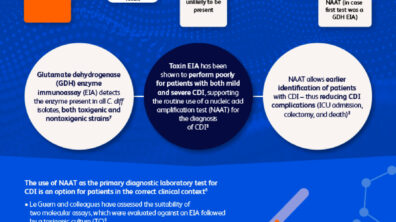
Tuberculosis - September 28, 2023
The study that supported the WHO endorsement of the BD MAX™ MDR-TB Assay
Comparative Analytical Evaluation of Four Centralized Platforms for the Detection of Mycobacterium tuberculosis Complex and Resistance to Rifampicin and Isoniazid
Margaretha de Vos, Lesley Scott, Anura David, Andre Trollip, Harald Hoffmann,
Sophia Georghiou, Sergio Carmona, Morten Ruhwald, Wendy Stevens, Claudia M. Denkinger, Samuel G. Schumacher
February 2021
Abstract
Failure to rapidly identify drug-resistant tuberculosis (TB) increases the risk of patient mismanagement, the amplification of drug resistance, and ongoing transmission. We generated comparative analytical data for four automated assays for the detection of TB and multidrug-resistant TB (MDR-TB): Abbott RealTime MTB and MTB RIF/INH (Abbott), Hain Lifescience FluoroType MTBDR (Hain), BD Max MDR-TB (BD), and Roche cobas MTB and MTB-RIF/INH (Roche). We included Xpert MTB/RIF (Xpert) and GenoType MTBDRplus as comparators for TB and drug resistance detection, respectively. We assessed analytical sensitivity for the detection of the Mycobacterium tuberculosis complex using inactivated strains (M. tuberculosis H37Rv and M. bovis) spiked into TB-negative sputa and computed the 95% limits of detection (LOD95). We assessed the accuracy of rifampicin and isoniazid resistance detection using well-characterized M. tuberculosis strains with high-confidence mutations accounting for >85% of first-line resistance mechanisms globally. For H37Rv and M. bovis, we measured LOD95 values of 3,781 and 2,926 (Xpert), 322 and 2,182 (Abbott), 826 and 4,301 (BD), 10,398 and 23,139 (Hain), and 2,416 and 2,136 (Roche) genomes/ml, respectively. Assays targeting multicopy genes or targets (Abbott, BD, and Roche) showed increased analytical sensitivity compared to Xpert. Quantification of the panel by quantitative real-time PCR prevents the determination of absolute values, and results reported here can be interpreted for comparison purposes only. All assays showed accuracy comparable to that of Genotype MTBDRplus for the detection of rifampicin and isoniazid resistance. The data from this analytical study suggest that the assays may have clinical performances similar to those of WHO-recommended molecular TB and MDR-TB assays.
Copyright © 2021 de Vos et al.













